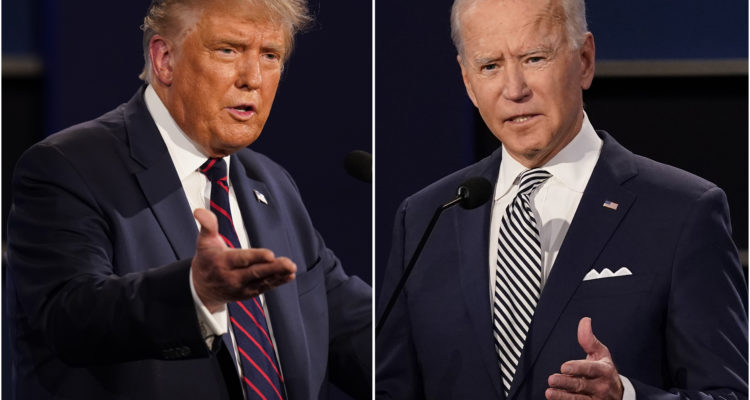in the wake of the Oct. 7 attack and the backlash to Israel’s response, antisemitism has become a vulnerability for Biden – and Republicans are noticing.
By Ron Kampeas, JTA
The debate comes at a touchy time for Biden’s relations with Israel. The president is enduring tensions with Israeli Prime Minister Benjamin Netanyahu, who has accused the administration of slow-walking weapons deliveries — an accusation the White House has denied.
Biden should expect hard questions on that front. He may be asked about mounting casualties in Gaza and how he reconciles his longstanding support for Israel with pressure he’s gotten from the left, younger Democrats, and Arab American and Black Democrats to scale back or end his support for Israel.
Trump, for his part, will probably refer back to his own presidency, when he had close relations with Netanyahu and pivoted longstanding U.S. policy in a wide range of areas toward the preferences of Israel’s right wing. He moved the U.S. embassy to Jerusalem, pulled out of the nuclear deal with Iran and recognized Israeli sovereignty in the Golan Heights. Israelis particularly celebrated the Abraham Accords, the normalization agreements between Israel and four Arab countries that the Trump administration brokered.
But Trump has been light on details when it comes to what he would do in the Middle East now — and that’s where the moderators and Biden may press him. How does Israel “finish it up” quickly without crumbling its Abraham Accords relationships? How does Trump intensify pressure on Iran as it threatens an all-out war with Israel? How do the Palestinians factor into hopes for expanding the Abraham Accords?
Trump is also not without vulnerabilities when it comes to Israel. When the war started, Biden was outspoken in his support of Israel, and became the first president to visit the country in wartime. Trump, meanwhile, chastised Israel for being unprepared, called Hezbollah “very smart” and attacked Netanyahu. The two men broke from each other after Netanyahu and congratulated Biden for winning in 2020, and Trump later said, “F— him.”
Expect both candidates to face questions on antisemitism.
A major Biden strength in 2020, at least in his campaign for the Jewish vote, was his emphasis on the correlation between the rise of violent antisemitism since 2016 and Trump’s rhetoric.
He said he was inspired to run after Trump equivocated in condemning the deadly 2017 neo-Nazi march in Charlottesville, Virginia. The man who carried out the Pittsburgh synagogue shooting in October 2018, the deadliest attack on Jews in U.S. history, was spurred by a baseless take on immigration that Trump has echoed.
In May 2023, to much fanfare, Biden unveiled a national strategy to combat antisemitism.
Now, however, in the wake of the Oct. 7 attack and the backlash to Israel’s response, antisemitism has become a vulnerability for Biden – and Republicans are noticing. Some pro-Palestinian protests that are largely associated with the left, both on campuses and on the streets, have included antisemitic signs and slogans. And some progressive Democrats who have harshly criticized Israel, such as Jamaal Bowman, the congressman who this week lost his New York primary — have used rhetoric their rivals say crosses into antisemitism.
Biden has publicly reviled these outbreaks of hostility, but his Republican critics say his party is implicated in the protest movement and that he has not produced results. His Education Department is investigating antisemitism on multiple campuses, but most of those probes are not yet completed, or their outcomes are not yet tangible. It is the Republican-led U.S. House of Representatives that has most prominently shone a light on vulnerabilities that some Jewish students say they feel on campus — and that has brought about the resignation of two Ivy League presidents accused of not taking a strong enough stand against antisemitism.
Trump and his acolytes, including one of his top Jewish surrogates, anti-immigration activist Stephen Miller, say without evidence that the protests are spurred by foreign students. Trump has said, likewise with no proof, that Biden’s visa policies will lead to a Hamas takeover of American streets and universities. Trump has said that Biden’s immigration policies generally make the United States more vulnerable to terrorist attack.
Biden is likely to seek to turn the antisemitism tables on Trump during the debate. A key theme of Biden’s campaign in recent weeks is the threat that Biden says Trump poses to democracy — it has become a centerpiece of Biden’s video ad campaign — and the Biden campaign has sent reporters multiple fact sheets listing the ways Trump’s authoritarianism leads to antisemitism.
Those fact sheets include Trump accusing, on multiple occasions, Jews of not being loyal, reports of his admiration for Hitler, his dinner last year with two well–known antisemites and a recent Trump campaign social media post that appeared to celebrate the return of a “unified Reich” — a term associated with the Nazis. (Trump’s campaign said the post was a low-level staffer’s error.)





